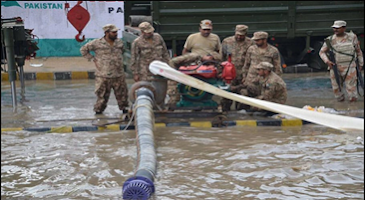Pakistan Army: Disaster Relief and Management
Experts
Natural disasters such
as drought, floods, heat waves, harsh colds, and earthquakes are common in
Pakistan. Climate change, growing urbanization, environmental degradation, pandemic,
and natural catastrophes on a larger scale all influence the sociopolitical and
economic dimensions in Pakistan. Pakistan faced many risks in recent years as a
result of global warming. It is mainly due to a lack of damage management
during environmental crises by the civil administration.
Pakistan Army did not demand an increase in its defense budget to support the country’s economy. Their constant effort for disaster relief management has earned them a reputable image internationally. They have always remained first at the crucial call of the motherland. Whether it is Attabad Landslide, Gyari Avalanche Tragedy, Earthquake in 2005, Floods, Tharparker, National Polio Campaign, COVID-19, or Locust Threat, Pakistan Army has always proved its dedication and commitment to Pakistan. They always worked frontline for disaster control.
When on October 8, 2005, an earthquake brought the biggest natural disaster ever to strike Pakistan. Even at that time too, the civil government was ill-prepared to deal with it. It destroyed various parts of the country and triggered the country's greatest relief operation in history. The lack of a comprehensive disaster response structure and no civilian department allocated employees to disaster assistance exposed the shortcomings of the existing system but also inspired the creation of a more solid framework. The government's only dependence was on Pakistan Army for rescue and relief operations.
The Pakistan Army's relief and rescue operations in earthquake-affected areas showed an exemplary model that no other force could manage prompt and widespread rehabilitation. National and international media both acknowledged that it was the finest humanitarian assistance done with such speed and commitment.
Weather conditions are worsening due to climate change. The Pakistani army developed humanitarian efforts to lessen the difficulties faced by those impacted by the country's floods and prolonged heavy rain. Over 300 people have died in Pakistan due to severe rainfall. At this time, Karachi's businesses have been suspended, and are advised to close as severe rainfall has led to flash flooding, leaving at least 15 people dead. Army’s rescue efforts have always been much greater than mandated.










Comments
Post a Comment